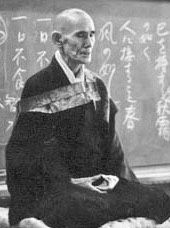Messing with Yasutani Roshi Again: Real Happiness and Peace

In this post I'm going to continue messing with Hakuun Yasutani Roshi (1885–1973, pictured above).
The original version of Yasutani Roshi's commentary that I'm working with appeared in The Hazy Moon of Enlightenment, by Taizan Maezumi and Bernard Tetsugen Glassman. But, as with the last post, I've done something unusual with it - I've edited the version published in Hazy Moon, replacing their translation of Wansong's preface with mine and doing some other light editing (e.g., using Pinyin rather than Wades-Giles for the Chinese).
Again this is from Record of Going Easy (J., Shoyoroku), Case 11 Yunmen’s Two Illnesses:
Wansong’s Preface to the Assembly
Without a body, a person suffers illness.
Without hands, a person combines medicine.
Without a mouth, a person takes the medicine.
Without receiving it, a person is happy and peaceful.
Yet, do tell, how can you recuperate from an illness caused by the medicine?
Yasutani Roshi Commentary
Yunmen is Zen Master Wenyen, who lived on Mt. Yunmen in Kwang-chou province. First he visited Venerable Muzhou and had an initial clarification of the great matter of life and death. Afterwards, under Zen Master Xuefeng, he exhausted the essential mystery and became a Dharma heir of Xuefeng.
Within the Record of Going Easy (Shoyoroku) appear eight koans of Yunmen. In the Blue Cliff Record appear eighteen of Yunmen’s koans. Yunmen undoubtedly holds a most important position with respect to Zen teaching. He is the founder of the Yunmen school.
Since Yunmen reveals four conditions of Zen sickness in the “Main Case,’’ old man Wansong draws a bead on that and in his ‘’Preface to the Assembly” sets forth four kinds of sick persons, each different from the others. Although there is a connection in that they are alike all sick and that there are gradations in the severity of their illnesses, the four persons are not the same.
“Without a body, a person suffers illness.” What is this? What it says is nothing at all extraordinary. A bodiless person is one who, having dropped off mind and body, has opened their eyes. They are no longer afflicted in body and mind. The view of “things” and “‘self’’ has been totally removed. To say it in foul language, it’s “peace of mind and quietness of spirit.” This is no doubt an important matter, but sit down here and it becomes an illness. That is, “Without a body a person suffers illness.”
As for Wansong’s second sickness, “Without hands, a person combines medicine” - being a handless person, for the first time one can freely hold things and release them. When no notice is taken of the hands being used, things can really be held or put down. The apparent increase in thinking that nowadays things are more skillfully handled is a paralyzing sickness, for sure. A person who is handless has dropped off mind and body. In addition to the whole world being the bright light of your own self and the omnipresent hue of dropped-off mind and body, heaven is heaven, earth is earth, what is manifest is the koan, you are loyal and have respect for parents—it’s a world where there is no lack. Compared to the previous, this state is one stage more splendid, but sit down here and, as you might expect, it becomes an illness.
“Without a mouth, a person swallows food.” It’s the same as the one before, but has greater degrees of depth and shallowness. It is a sickness one stage more acute. Take note that it is written “swallows food,” not “takes medicine.’’
“Without receiving, a person is happy and peaceful.” What sort of person is a non-receiving person? In the estimation of the buddhadharma, it is certain that to receive is to suffer. Whether glory or status or authority or wealth, to receive any of them is suffering and the cause of suffering. And not because inheritance tax has to be paid. Common people think receiving is a pleasure; that is called “topsy-turvy pleasure.” To run away, wishing not to receive anything at all, is what a Hinayana Buddhist practitioner does. The Mahayana bodhisattva receives anything, but receives it without attachment. Having become an unattached person, one can for the first time appropriately and freely receive. That is real happiness and peace.
Receive everything, be unattached to everything. Unattached, you can manage everything. The ultimate of that is the non-receiving person, although they are not yet the person of great liberation. It’s the place of truly great happiness and peace. However, that at once becomes the great-happiness-and-peace sickness. Become stuck even to a comfortable chair and it becomes a painful affliction. With that, four “sittings down” have been given.
“Yet, do tell, how can you recuperate from an illness caused by the medicine?”
An incurable disease is a difficult one that is not affected even by the powers of acupuncture and medicine.
With the question of how one should medically treat the above four difficult diseases, Wansong comes to the “Main Case.”
(to be continued)